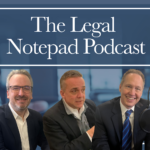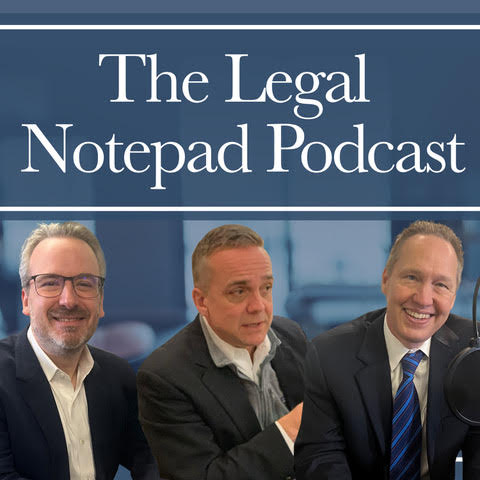Episode 3: Louisville attorneys Rob Mattingly and Kevin C. Burke are joined by Rob’s paralegal, Lauren Hincks, for a detailed discussion of the topic of Stipulation of Liability. The Life, Love and Law Podcast covers a variety of topics. This episode begins a series of legally-focused episodes geared toward helping Kentucky attorneys.
Editor’s Note: If you are an attorney and would like CLE credit for this episode, visit the Kentucky Justice Association website, click the Education and Training tab and look for the podcast.
Meet Kevin C. Burke
Kevin is a partner in the firm, Burke Neal, PLLC. His practice primarily focuses on appellate work at the Kentucky Court of Appeals and the Kentucky Supreme Court levels. He also assists trial attorneys with briefing and strategic issues at trial.
Kevin began as a solo practitioner about 25 years ago. Over time, his practice involved working on a significant number of appeals. This eventually lead to the founding of Burke Neal, PLLC with his partner, Jamie Neal.
Rob and Kevin will have a case file available, free of charge, for any attorney who contacts them with a request for information.

TODAY’S LEGAL QUESTION:
Can a Defendant Make a Plaintiff Stipulate Away Part of Their Case?
Kevin begins by stating the answer is generally no. He’ll refer to two main cases during this discussion:
- Davis v. City of Winchester, 206 S.W.3d 917 (Ky. 2006)
- MV Transportation, Inc. v. Allgeier, 433 S.W.3d 324 (Ky. 2014)
Davis v. City of Winchester
Rob explains the plaintiff had a disputed altercation with police. The plaintiff was injured during the arrest, resulting in a civil claim. As the claim proceeded, defense in the civil trial wanted to stipulate away part of the claim, thus keeping out certain evidence impacting the plaintiff’s claim of malicious prosecution.
Kevin comments on the malicious prosecution element. The City didn’t want the jury to know the underlying criminal charges were dismissed. They filed a motion in limine. The plaintiff disagreed, but the trial judge granted the motion. It went up on appeal and eventually made came before the KY Supreme Court.
In reaching its decision, the Supreme Court borrowed from criminal law and applied it to this civil action. They reasoned, if you can’t do this in a criminal case, why should you be able to do it in a civil case? Accordingly, you shouldn’t be able to stipulate away part of the case. The Court cited:
- Barnett v. Comm, 979 S.W.2nd 98
- Johnson v. Comm, 105 S.W.3d 430 (2003)
- Harris v. Comm, 134 S.W.3d (Ky 1998)
Kevin notes that the KY Supreme Court found the trial court’s allowing of the stipulating away of a key element is reversible error. Litigants have a substantial right to prove every element of the claim.
Both Rob and Kevin comment on the points raised in the decent. Rob adds there will also be a subsequent episode on the need to properly preserve objections. Many attorneys, unfortunately, aren’t doing this correctly.
Lauren raises a question involving the fact that the Court stated “a stipulation of fact wasn’t filed or submitted to the jury.” What does this mean?
Kevin clarifies the issue. Black’s Law lists a stipulation as “a voluntary agreement…” He comments the Court was considering the dictionary definition of the term. In this circumstance, the stipulation could be viewed as decision that was made unilaterally, rather than by agreement of the two parties.
MV Transportation, Inc. v. Allgeier
Rob explains the basic facts of the case. A pedestrian, in a wheelchair, was exiting a TARC transport bus and sustained a serious injury. There were multiple claims. The defense wanted to stipulate away a lot of evidence by admitting the bus driver was actually a TARC employee. However, that would have eliminated evidence related to other elements of the multiple claims.
Kevin points out the difference in MV Transportation is that the defense was attempting to stipulate away multiple claims by admitting the employment status of the bus driver. This is different from Davis in which only 1 claim was being stipulated away. The defense, in MV Transportation, wanted to eliminate the direct negligence claims. This would have included a punitive damage claim.
The trial court dismissed the punitive damage claim, but decided to allow the evidence of all of the remaining claims to go to the jury. The jury found in favor of the plaintiff. The Court of Appeals agreed with the trial court’s ruling. The KY Supreme Court also upheld the ruling.
Kevin point out it’s important to note that this case involved an issue of first impression in Kentucky. Kevin wrote the amicus brief in this case. It made it to the Supreme Court on discretionary review.
In his brief, Kevin cited Davis v. City of Winchester. He reasoned if you can’t stipulate an element of a claim, you can’t stipulate a whole claim. In the analysis, the “majority rule” of the other states, which have already dealt with similar cases, wasn’t part of the decision. The Court looked deeper into the purpose of the rulings.
Rob and Kevin discuss the issue of punitive damages and how they related to this type of situation. Interestingly, the Supreme Court, in MV Transportation, remanded it back for a limited retrial on the punitive damage claim.
Lauren notes specific language in the Supreme Court’s decision: “a finding of gross negligence and an award of punitive damages may be based, at least in part, upon evidence regarding the policies and procedures of the company.” Why does this come up so often?
Kevin explains the MV Transportation clarifies the question of whether policies and procedures can be introduced as evidence to support a claim of punitive damage. Rob remarks a future episode will focus on the admissibility of policies and procedures and violations of those policies and procedures. As Lauren noted, it is beginning to come up with increasing frequency.
In conclusion, the discussion answers the original question. No, you can’t be forced to stipulate away your claim. This includes either an element (Davis) or an entire cause of action (MV Transportation).
As we continue the podcast episodes, Episode 4 will focus on the Fratzke opinion and its progeny.
Please help us to grow The Legal Notepad Podcast by sharing this episode on your social media and sending a link to your friends and colleagues.
Rob challenges each of you to go out and find one thing, today, you can do to help change the world.
Thanks for listening!
For More Information about the Law Offices of DeCamillis and Mattingly, PLLC
Address: 138 S. Third Street, Louisville, KY 40202 (across from The Old Spaghetti Factory)
Phone: (502) 589-2822
Website: DeCamillisMattingly.com
To Contact Kevin Burke:
Website: BurkeNeal.com
Phone: (502) 709-9975
The Kentucky Bar Association Requires Us to State “This is an advertisement.”



